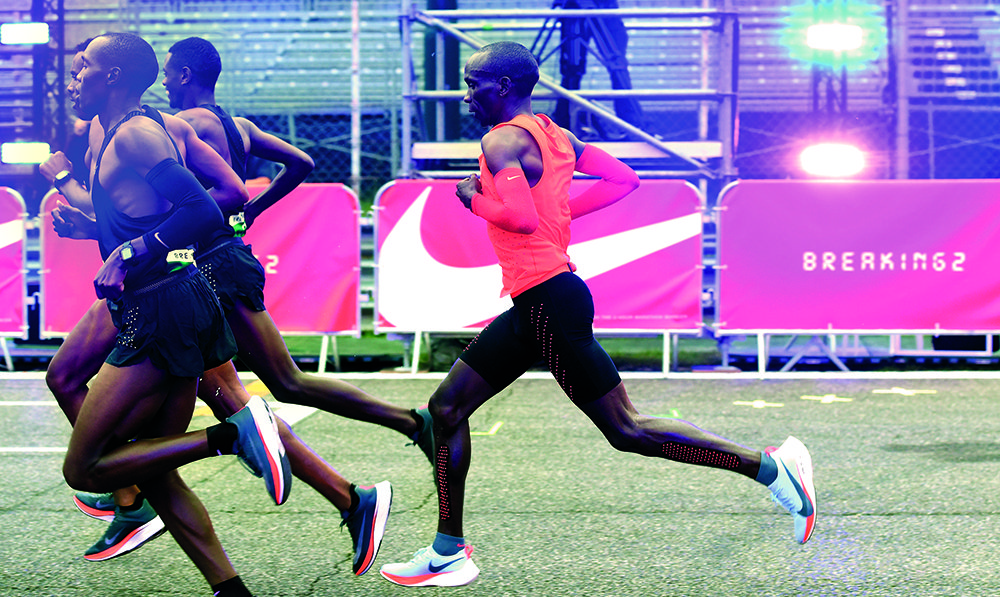Eliud Kipchoge’s Training Secrets Revealed!
The world's fastest marathoner has a few key training secrets under his belt...
The world’s fastest marathoner has a few key training secrets under his belt… – By Dr Ross Tucker

Eliud Kipchoge may not hold the official marathon world record, but with a little help from Nike and Tesla, he has run the fastest marathon ever – 2:00.25, in a staged (and thus ineligible) event in Monza, Italy.
RELATED: Kipchoge Runs A 2:00:25 In The Breaking2 Attempt
Kipchoge’s attempts at breaking the world record (2:02.57) have been undermined by rain (most recently in Berlin, in September), shoe malfunctions (also in Berlin), and tactical race situations.
Just before the 2017 Berlin marathon, his training programme found its way onto the internet. We could see what went into producing his 2:03.32 performance, in wet, unfavourable conditions.
While his brutal regime is beyond the reach of pretty much everyone in the world, it’s the principles that are valuable. Whether you’re running a 2:03.32 marathon or a 2:03.32 half marathon, there are lessons you can learn from the best.
BE CONSISTENT
Kipchoge is remarkably consistent – about 10 sessions a week, and 170 to 190km a week. Often you hear coaches and athletes advising that you should train hard for two weeks, then have a week with less training. Sometimes it’s three weeks on, and a fourth for recovery. Not so for Kipchoge – the ‘uniformity’ of his training is striking.
RELATED: Kipchoge Takes The Berlin Marathon Win, But The World Record Stands
The principle we can learn from this is consistency. I’ve often said that ‘physiology rewards consistency’, in that our bodies adapt to the stress of training, and that the adaptation is better when we are consistent. ‘Yo-yo’ training, or chopping and changing the approach regularly, does a disservice to your physiology.
VARIETY IS GREAT!
That’s not to say you should just repeat the same thing over and over again – there’s lots of evidence that ‘monotony’ is a big predictor of overtraining and injury. Variety is great: yo-yoing is not. One of the key lessons you learn through experience and awareness is how much to change, and how much to consolidate and repeat.
RELATED: The Overtraining Matrix
The same applies to Kipchoge’s training within a week. Contrary to much of what you’ve no doubt read, he has no weekly rest days. His ‘rest day’ is simply an easy run of an hour. By ‘easy’, we’re talking incredibly slow speeds at the start – 5.45/km to 6.00/km – and even though he speeds up at the end and covers about 18km in the hour, he’s allowing his body to recover actively.
KNOW YOUR LIMITS
Kipchoge has earned that right by being supremely fit, but his training illustrates the value of understanding what we can call the relativity of rest. Most of us need a complete day off – perhaps weekly, or every ten days, or every two weeks. Some need two days off a week, or maybe one complete rest day and one day of swimming, or walking, or some other training.
RELATED: 10 Simple Moves To Injury-Proof Your Body!
The point is: learn your body’s limits. And when you’re about to cross that threshold of overdoing it, either rest, or vary the training enough to avoid crossing it. But appreciate that one person’s rest day is another’s training – and that your life outside of training is also stressful. Rest means rest!
Finally, Kipchoge’s training teaches us about simplicity: you don’t see any gimmicks. There are long, hard efforts near marathon pace, steady runs slower than pace, and speedwork faster than pace.
It’s really easy to get pre-occupied with ‘tricks’ and strategies to amplify training effects. But running is a fundamental activity, and its base principle is that you train for specific goals.
RELATED: 6 Reasons You Need To Do Speedwork
So if the world’s best marathon runner doesn’t need to tinker and fidget, and can succeed with basic sessions like 18 x three minutes hard, one minute easy… then we all can.
RW Scientific Editor Dr Ross Tucker has a BSc (Med) (Hons) Exercise Science Degree and PhD from the Sports Science Institute. Visit him at www.sportsscientists.com.
READ MORE ON: Eliud Kipchoge KIPCHOGE WORLD'S FASTEST MARATHONER



